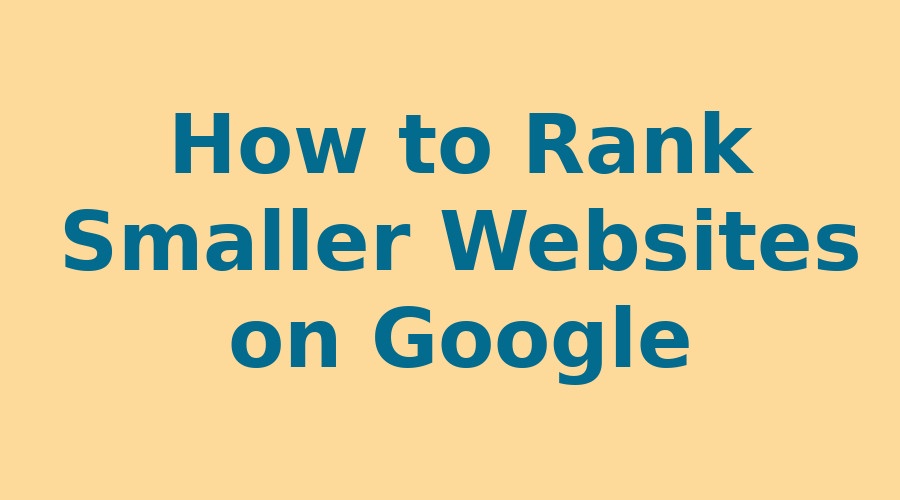You see all these big sites dominating Google, but, we're not all big sites, we're not all billion-dollar companies. What happens if we have a small website with little to no backlinks, very little content? Is it even possible for us to get rankings on Google?
Here's something that you may not know. Google's diversity update in June 2019 gave different types of sites more opportunities to rank by limiting the number of times a single domain can appear in a single SERP. A single website can't rank more than two times in a SERP. That excludes branded key terms, of course. But this allows smaller sites to have a chance to rank among the big dogs like Amazon, or Microsoft, or whoever else it may be that's dominating the SERPs.
So, how do you go out there and rank your new site that's small, really high, at a quick time period?
Well first off, you can start with exact-match domain name. Now a lot of people say exact-match domain names don't work as well as they used to, and that's correct, but they still do. Creating a domain that's an exact match to the service or product you're selling is a great way to get some traction in the SERPs. This works specifically well for localized keywords and long-tail keywords. It doesn't work well for head terms. If your site gets a little traffic, scoring an exact-match domain name could get you a spot really high up in the SERPs.
A good example of this is, let's say you're a tailor in Chicago, Illinois. Having a domain name like IllinoisTailor.com is a great way to rank higher.
Gaps.com did a study on exact-match domain names for one-page sites. They tested multiple exact-match domain names and created small sites for those domains. And this is what they found. They created a domain name called ShoferDriver.co.uk. Chauffeur is commonly misspelled, and, for this term, they used SHOFER Driver.co.uk. In other words, they misspelled chauffeur. Something really important that came out of this was, a lot of people were searching for the misspellings, and this helped them rank higher.
It was simple, it was easy, and after doing this, with a one-page website and two backlinks, the site made it to page two of Google. Imagine if they showed a website with a little more log. They would've climbed up to page one, and potentially to the top of page one.
So a pro-tip for you is, when you're looking for exact-match domains, you could also look for misspellings as well. Another study that they conducted was a near-me domain name. They bought a domain name titled, ApartmentsNearMe.co.uk, and created a one-page website with no backlinks. The entire website consisted of a contact page and about 1,000 words of content. The page ranked on page one of Google, likely due to its relevancy of the domain name.
The next thing that you can do is build one-on-one engagements with customers. Where big brands often tend to ignore is small things like personal engagements with their customers. This is how I compete with really large companies. You'll see that I respond to comments on NeilPatel.com, YouTube, Facebook, LinkedIn, even Instagram. I'm pretty much everywhere, why? Because I care about you and I care about your success. Big companies, I'm not saying that none of them ever do this, but most of them don't. They don't care, they're faceless, and this is one way that you can compete with these larger corporations.
So simple things that you can do is respond to all comments on social media, whether they're good or bad, set up live chats on your website, that way people can engage and interact with you or other members of your team. You can offer amazing customer service. People love this. It's really taken for granted in large corporations. And, just doing that more personal approach will start gaining you those social signals, which will help you with your search engine rankings.
Next, focus on long-tail keywords. According to Search Engine Guide, Amazon makes 57% of their sales from long-tail keywords. That's because long-tail variations, especially those with commercial intent, convert very well. Focus on the less competitive key terms that big brands typically ignore. Focusing on long-tail keywords is a great way to find high-quality traffic. Since long-tail keywords are typically more specific in nature, scoring them typically generates more leads, more sales, more conversions.
If you're looking for these long-tail keywords, the easiest way to find them is you go to Ubersuggest, you type in a keyword that's a head term, and it'll show you in the keyword ides report all the long-tail variations, and even other head term variations of that keyword.
 Look for the ones that have high search volume, high CPC, because high CPC usually means that keyword generates sales, and look for ones that have a low SEO difficulty score. Scores of 40 and under are easier to rank for than ones that have a high SEO difficulty.
Look for the ones that have high search volume, high CPC, because high CPC usually means that keyword generates sales, and look for ones that have a low SEO difficulty score. Scores of 40 and under are easier to rank for than ones that have a high SEO difficulty.
Create valuable specialty content in your niche. Did you know that Google prefers niche sites over broad sites? Do you remember that old-school site, About.com that used to be about everything? Well, it was one of the largest sites on the web, but over time it started to die, why? Because Google prefers niche sites. What they decided to do is take their About.com site and turn it into six vertical specific sites. All their million-plus articles wouldn't fit into those six verticals, so they deleted roughly 900,000 pieces of content. By having those six vertical sites, not only did their traffic grow, but they also saw increase in revenue by 140%. That's more important than traffic. That's a huge win.
Since your site is a smaller site, you can have a complete focus on your specialty and niche. This will help you do better than your competition. This allows you to provide more value for your users in your content, which is often ignored by those larger companies. You can become the credible go-to source for anything in your vertical. Just look at Backlinko.com. Brian Dean is known as the link guy in the SEO industry. He's really gotten niche specific. Sure he does more than that, and he's smart, and he's an amazing guy, I've known him for years, but taking that niche was really smart by him. This allows you to offer more value than any broad site out there, which then, in turn, helps with your rankings in the long run.
Make your site mobile-friendly. I can't reiterate this enough. Google has mobile-first indexing, and over 50% of the searches are now done on mobile devices. So having your site optimized for mobile devices is huge. If you're not doing this, you're not going to do well. So make sure your site's responsive, and it loads fast. If you're not sure on how to make your site load faster, Google has a page speed tool which optimizes, tells you what's wrong with your load time so you can optimize for it, and you can also use free solutions like Cloudflare, to put your site on servers all across the world for free, which of course helps with your load time as well.


No comments yet